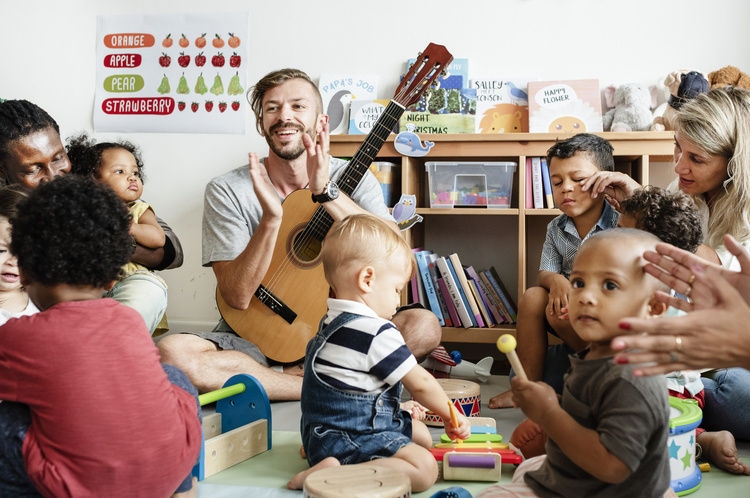What are social skills and how can I encourage them?
Social skills include verbal and non-verbal communication and an understanding of appropriate interactions in various social settings. Skills that may help your child socially can include empathy, sharing, language, planning and cooperating in groups.
As a parent, it can be helpful to think of your home as a micro-version of the types of situations your child will encounter in the world as they grow up. Their habits are formed in the home from a very young age, so practise key skills to help your child integrate into daycare or school:
- Eye contact. Hold your child’s gaze as you speak with them. Eye contact is an essential way to bond and can help children to connect with new people.
- Manners. Teach your child about ‘please’ ‘thank you’ and ‘may I’ by speaking to them politely.
- Lead by example. Your child sees how you interact with others and will likely mimic this behaviour. When interacting with people in front of your child, speak to them in the way you’d like your child to copy.
- Read stories and ask questions. Language skills begin to form from day one, so reading out loud and chatting to your little one is always teaching them something. Comprehending and using language properly is crucial for good communication.
- Express feelings. Teach your toddler how to label their emotions and express when they do or do not like something. Learning to express their needs is the best way to have them met, and it might make it easier for you to understand your little one as they gain independence.
- Sharing. Involve sharing in playtime. Try explaining that it’s mummy’s turn to have this toy for a little while, but they can have it back soon. Experience with sharing may be helpful for making friends.
- Be patient and understanding. Children adapt their behaviour based on their caregiver’s response, so do your best to remain kind, calm and loving even when your toddler is exhibiting some challenging behaviour like tantrums – although that may not always be easy! Explain how to better handle something next time, rather than getting angry straight away.
- Empathy. Try asking questions about how your little one thinks a certain character on TV may be feeling, to practise putting ourselves in other people’s shoes.
Equipping your child with social skills is important to help them function on their own as they become involved in more social groups. However, it is important to remember that all children go through different phases and their respective personalities will respond differently to different social situations.
How can I tell if my child’s social skills are developing normally?
Development can take time, so try not to compare your child to others. If you find your toddler is struggling to make friends, or are often reacting to situations in extreme or unhelpful ways, such as refusing to share, chat to your GP about your little one’s progress.
Keep an eye out for signs which could suggest difficulty developing social skills (but noting these skills will usually develop over time):
- Fleeting eye contact, or avoiding your gaze.
- Speaking over the top of people frequently and being unable to take turns in conversation.
- Unusual or inappropriate body language such as standing too close to someone while chatting, or having their head turned away.
- Showing a lack of interest in what others have to say.
- Taking things too literally, e.g. ‘Can you pick up your toys?’ leading to ‘yes I can’ without a move to actually pick them up.
- Extreme reactions to disappointment or failure.
- An inability to understand the consequences of their actions.
Growing up
Don’t be afraid to ask your toddler big questions. Prompting deep thinking about morals, ethics or what they would do in a hypothetical situation is a great way to encourage independent thinking. Of course, stick to age-appropriate content matter, but remember that you’re teaching your little one how to become a big kid.
Pass on the lessons you’ve learned about how to have successful social interactions. Be mindful of how you engage socially, remembering this will inform your child’s understanding of the world around them. With practice and exposure to new things, your little one will likely develop social skills and make friends! Chat to your GP if you’re unsure what to make of your toddler’s behaviour but remember that all children are different with different personalities, strengths and challenges.



